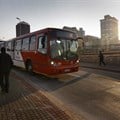Test run for Metrobus in Maputo

Passengers started their journey at about 5am, travelling by bus from the localities of Bobole, Tsevene, Michafutene, Agostinho Neto village and Memo to Marracuene rail station, about 30 kilometres north of Maputo.
At Marracuene, they boarded the second-hand railcars imported from New Zealand by the private company Fleetrail. The Fleetail train left Marracene at 6.05am and arrived at Maputo Central station at 7.25am, stopping at three stations en route.
This first experience was free of charge, and did not cover what is likely to be the most important route for Metrobus, which is the line from Matola to Maputo.
Among those travelling on Metrobus was Transport Minister Carlos Mesquita, who said this was part of a long journey towards guaranteeing mobility of citizens with efficiency, safety and dignity.
“The country is facing financial difficulties, but that doesn't mean we should stop having initiatives and creating conditions so that partners who want to join with the government can help solve the problem of urban transport”, said Mesquita.
Making maximal use of existing routes
The combination of road and rail transport, he added, will make the best and maximal use of existing routes.
Metrobus is a private initiative, which depends on the cooperation between Fleetrail and the publicly owned ports and rail company, CFM, which is leasing use of its tracks to Metrobus.
According to the general manager of Fleetrail, Amade Camal, when Metrobus begins commercial operations, its first routes will be to the west of the capital, from Matola and Machava to Maputo Central station. In June, the commercial operations will extend to the routes from Maracuene and Boane to Maputo, and as from December 2018, Metrobus will be running services from Ressano Garcia and Goba, on the borders with South Africa and Swaziland, to Maputo.
Camal said that Fleetrail has decided to reduce the price of a monthly train and bus pass from the initial proposal of 3,500 meticais (about $60) to 2,500 meticais. A family pass, for four people, will cost 6,250 meticais.
These prices are much more expensive than those charged by CFM for its train services, or by the owners of the minibuses (known as “chapas”) which provide much of Maputo's passenger transport. But Fleetbus is not aiming its services at the poor.
The idea, Camade explained, in an earlier interview, is to persuade middle-income Mozambicans to leave their cars at home and travel on the Metrobus instead. For someone who drives from Matola to Maputo and back every day, the Metrobus price is competitive, since he would certainly spend more than 2,500 meticais on fuel in a month. It will also be much quicker: Camal said the Matola-Maputo journey will only take 15 minutes by Metrobus.
Fleetrail currently has four railcars, each with four carriages, and a fleet of 100 buses of varying sizes. Each Metrobus train can carry 540 passengers, all seated. The trains will run all day, unlike the CFM trains, which only run at peak hours.
Buses donated by Chinese government
Also on Monday, a fleet of 26 buses, each able to hold 60 passengers, began operating in the outer Maputo urban district of KaMavota. These are part of the consignment of 200 buses donated by the Chinese government. They will operate routes from the neighbourhoods of Albazine and Magoanine to central Maputo.
This is a major boost to the Maputo municipal bus company, EMTPM, which up until now has only had four buses for the KaMavota routes. The 26 new buses will be able to carry about 23,000 passengers in a day.
“I think this is the best Christmas present the government could have offered to the public, given the transport crisis that Maputo and Matola are facing”, said the Maputo municipal councillor for transport, Joao Matlombe. “This shows the government's commitment to finding solutions to the transport crisis”.
The KaMavota routes are also served by some of the city's 400 or so licensed private minibuses (known as “chapas”). But there are not enough of them, and the gap has been filled by illegal (but largely tolerated) operators who cram passengers into pick-up trucks, referred to ironically by the English phrase “My Love”.
Matlombe promised that KaMavota will receive more buses in the near future. An independent study calculated that this urban district needs at least 60 buses.
Source: allAfrica

AllAfrica is a voice of, by and about Africa - aggregating, producing and distributing 2000 news and information items daily from over 130 African news organisations and our own reporters to an African and global public. We operate from Cape Town, Dakar, Lagos, Monrovia, Nairobi and Washington DC.
Go to: http://allafrica.com/






















